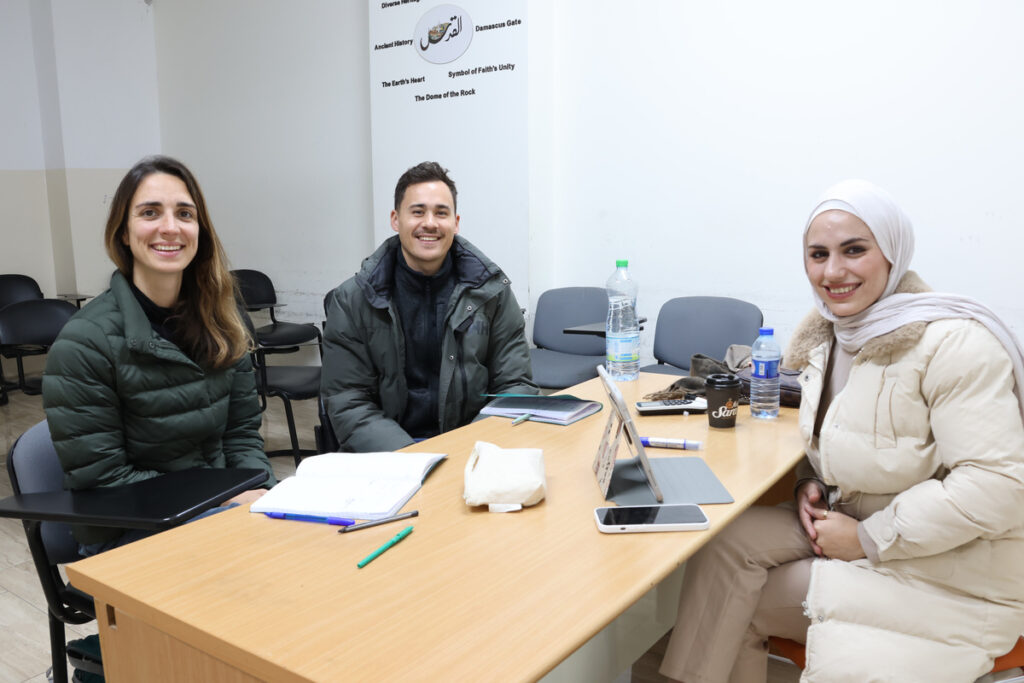Arabic Programs Abroad in Palestine and Syria 2025-2026: Arabic is one of the world’s most widely spoken (and most beautiful) languages. Present across the whole Middle East and North Africa region, and in many diaspora communities across the world, Arabic is a great language to learn for anyone interested in current affairs or getting to know a new culture!
There are a lot of places where you can study Arabic, but we recommend coming to study in Palestine. Why? It is a culturally and historically rich environment, with incredibly welcoming people, and a great option for immersive learning in an Arabic-speaking society. The dialect in Palestine is also closest to Modern Standard Arabic (or MSA), which makes it a really useful one to learn! (We’ll talk more about that later).
Learning any language is hard, but it can be made a lot easier by being immersed in a society that speaks it! Coming to Palestine for Arabic is a great way to really jump-start your learning and get you speaking right away.
Table of Contents
Why Choose Palestine or Syria for Arabic Studies?
Authentic Language Immersion
Living and studying in Palestine or Syria is a great way to experience a really authentic immersion and improve your language skills quickly. We mentioned dialect earlier, which is one of the biggest considerations when learning Arabic. Do you study Modern Standard Arabic? Do you choose a spoken dialect instead? If your answer is ‘why not both?’, then Palestine is a great choice for you.
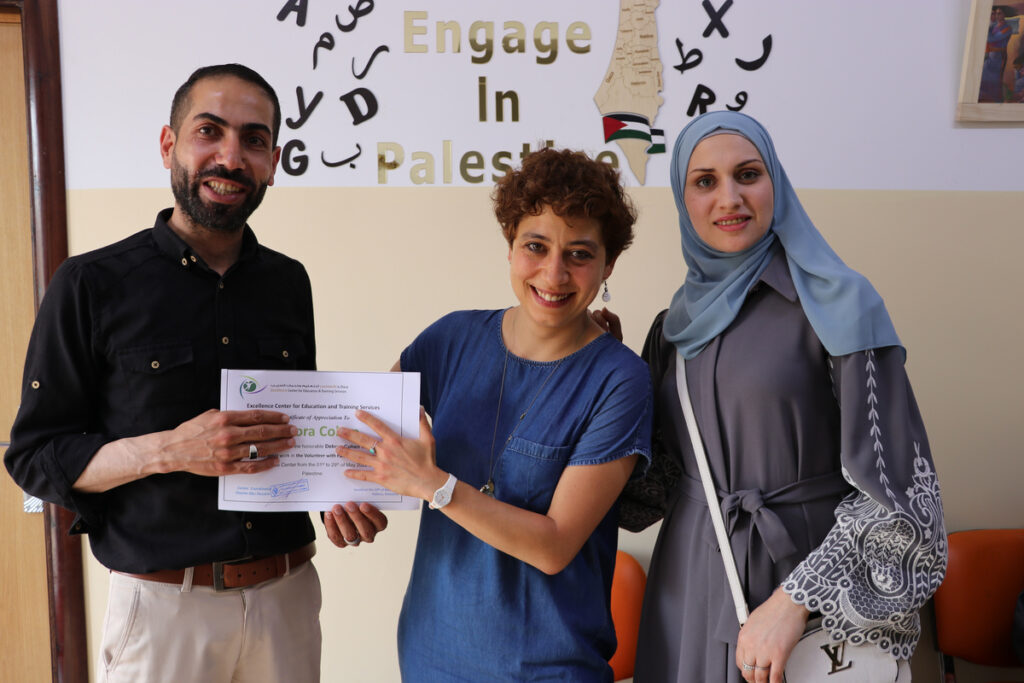
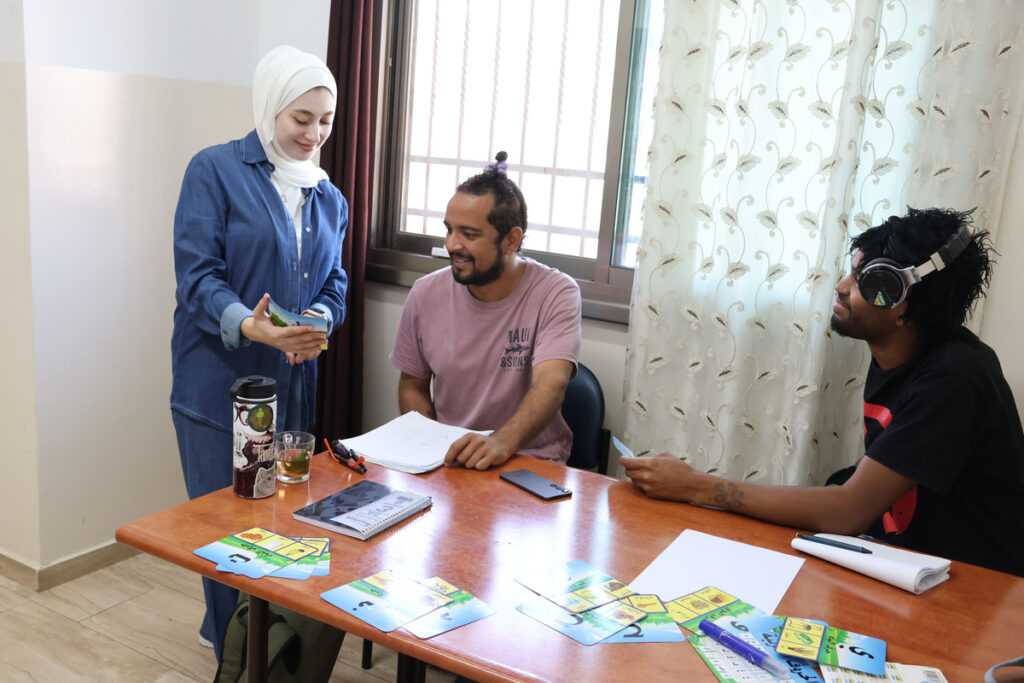
Let’s explore why:
- Exposure to Modern Standard Arabic (MSA) for academic and formal use.
Modern Standard Arabic is the universal Arabic. It is understood by Arabic speakers almost everywhere, and is used for official documents, news, and academia. However, this form of Arabic is very formal and isn’t used for speaking to people in everyday contexts. Having a foundation of MSA is great to help support an understanding of Arabic’s grammar rules, as well as giving you a vocabulary to use if you get stuck across dialects, but it’s no good for a conversation.
- Learning Palestinian Colloquial Arabic (Ammiya) in real-life contexts.
If your language learning goals include speaking with people in everyday situations, learning a dialect is very important. Palestinian Colloquial Arabic (also known as Ammiya) is part of the Levantine (or Shami) Arabic family spoken across Syria, Lebanon, Jordan, and Palestine. Given how widely this dialect is spoken, it’s easily understandable by many other Arabic speakers, making it one of the most useful dialects to have. Ammiya is also the most similar dialect to MSA, so there is less of a difference if you already have foundational MSA or if you’re learning both.
Whatever your language goals, learning Arabic immersed in Palestine is the fastest way to get to where you want to be!
What is Syrian Arabic?
Syrian Arabic (اللّهجة السّورية – al-Lahja as-Sūriyya) is a central dialect within the Levantine Arabic family, widely spoken across Syria and the Syrian diaspora worldwide. As one of the most prominent dialects in the Arab world, it has more than 17 million speakers, including those in neighboring countries such as Lebanon, Jordan, Turkey, and further across Europe and the Americas. Syrian Arabic has been influenced by historical and geographical factors, including Turkish, French, Kurdish, and Aramaic, due to Syria’s rich cultural past, shaped by the Ottoman and French colonial periods.
This dialect shares similarities with other Levantine Arabic varieties, such as Lebanese and Palestinian Arabic, but it stands out with its own unique features in pronunciation, vocabulary, and informal usage. While Modern Standard Arabic (MSA) is used in formal contexts like writing, education, and media, Syrian Arabic thrives in daily interactions and informal settings. It plays a significant role in Syrian popular culture, especially through TV dramas, music, and social media, which contribute to its prominence in the Arab-speaking world.
Syrian Arabic has also been shaped by its diaspora, with speakers adapting and integrating local influences wherever they reside. While the dialect may vary between regions, with notable differences between urban, rural, and Bedouin forms, it remains mutually intelligible across the Levant. The language is both dynamic and evolving, blending traditional elements with modern innovations, making it a key dialect for learners interested in connecting with the broader Arabic-speaking world.
Cultural & Historical Enrichment
Your time studying Arabic will be incredibly enriched by exposure to the local Palestinian culture and day-to-day life.
We’ve already mentioned how welcoming Palestine is. The hospitality of the people here is legendary, and one of the best parts of studying Arabic in Palestine is getting to experience this! Day to day, you can expect people to offer you tea and coffee in the street, receive invitations to meet people’s families, or to have dinner together (especially during Ramadan).
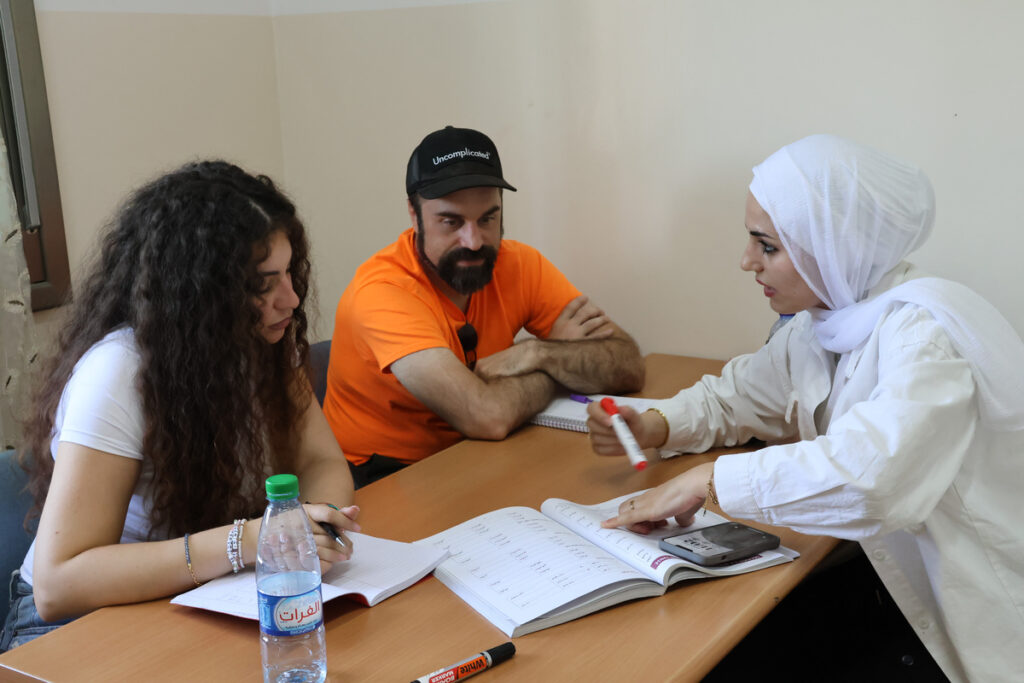
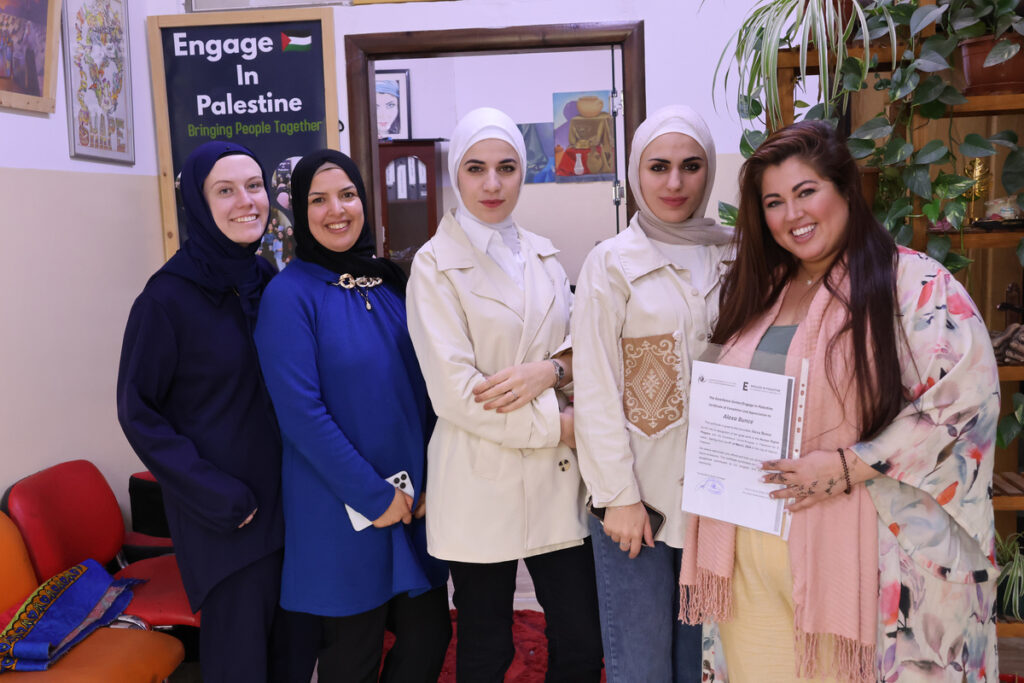
Studying Arabic in Palestine also gives you access to some of the most historically and religiously significant cities in the world. How old, you might ask? We’re talking biblical!
- Hebron: The economic hub of the West Bank, Hebron is an incredibly friendly place with a vibrant shopping and restaurant scene, and many sites with historical and religious significance. Study Arabic in Hebron for full cultural immersion.
- Ramallah: A more modern and cosmopolitan city, Ramallah is the NGO capital of the West Bank. It boasts many cultural institutions like the Mahmoud Darwish Museum and the tomb of Yasser Arafat. Study Arabic in Ramallah to be in the political center of Palestine.
- Nablus: Tradition meets community in Nablus, one of the northernmost cities in the West Bank. Nablus is a bit more quiet than the other options, and is known for its lovely local markets and delicious kunefe (insider tip – buy the kunefe at night!). Study Arabic in Nablus for a calm environment.
- Bethlehem: One of the most religiously significant places in the world, Bethlehem is situated just south of Jerusalem. In this beautiful city, you can visit sites like the Church of the Nativity (where it’s said Jesus Christ was born), and the Milk Grotto. Learn Arabic in Bethlehem to explore historical sites and travel easily to Jerusalem.
Affordable and Accessible Study Options
Another benefit of studying Arabic in Palestine is the cost. Compared to many other in-country destinations, Palestine is a very affordable option. Countries like Jordan, Egypt and Morocco have a relatively higher cost of living compared to areas in Palestine like Hebron. This makes it a much more accessible option for a wider range of people.
While affordable, it can also be worth looking at options to fund your study in Palestine. If you’re studying, your university might have funding available to subsidise or fully pay for your learning abroad. Some language schools, like Ta Marboota in Tunisia, offer tuition scholarships so you only have to cover your housing, travel, and living costs.
At Volunteer in Syria, accommodation, breakfast, and orientation in Hebron are all covered in your tuition costs. This can be a significant financial help when planning your time away.
Types of Arabic Programs in Palestine (2025/2026)
Intensive Arabic Language Courses
When picking an Arabic program, it’s important to make sure it can fit with your schedule and your language learning goals. For instance, you might consider what intensity level you’d like to do. If you have a short timeframe and a short-term language learning goal for work, you might need an intensive or super-intensive program. If you’ve got more time and want more of a relaxed language learning approach, you might go for a non-intensive option.
It’s also important to consider the focus of your program. Do you want to be able to speak easily to people? Are you more intent on reading and understanding the news? When you know what intensity you want, make sure to pick a program that aligns with your areas of focus.
University-Based Arabic Programs
Some Universities in Palestine, like Birzeit University and An-Najah University, offer courses in Arabic that you can take for a more formal or academic learning environment. These courses might be ideal for someone who would like to study Arabic over the course of an entire semester or during the summer break.
Most Universities will have accommodation options available (usually in addition to the tuition fees), and some may even support scholarships for students coming to learn Arabic from overseas. The benefit of studying at a University is that you can also gain academic credit, which can be helpful for progressing your degree. Academic credit is also available through Volunteer in Syria.
Online & Hybrid Learning Options
Can’t come to Palestine in person? Maybe you want to try out some online learning before you commit to travelling to visit us in person? Don’t worry, we’ve got you covered!
Online learners still get all the benefits of Palestinian Arabic lessons with our talented teachers, and learning about local culture and practices – all from the comfort of their own homes.
You can learn more about our online programs in this article.
Arabic for Specific Purposes (ASP) Programs
Want to learn Arabic for a specific purpose? There are plenty of tailored programs to help you develop the right language and vocabulary for your area of interest.
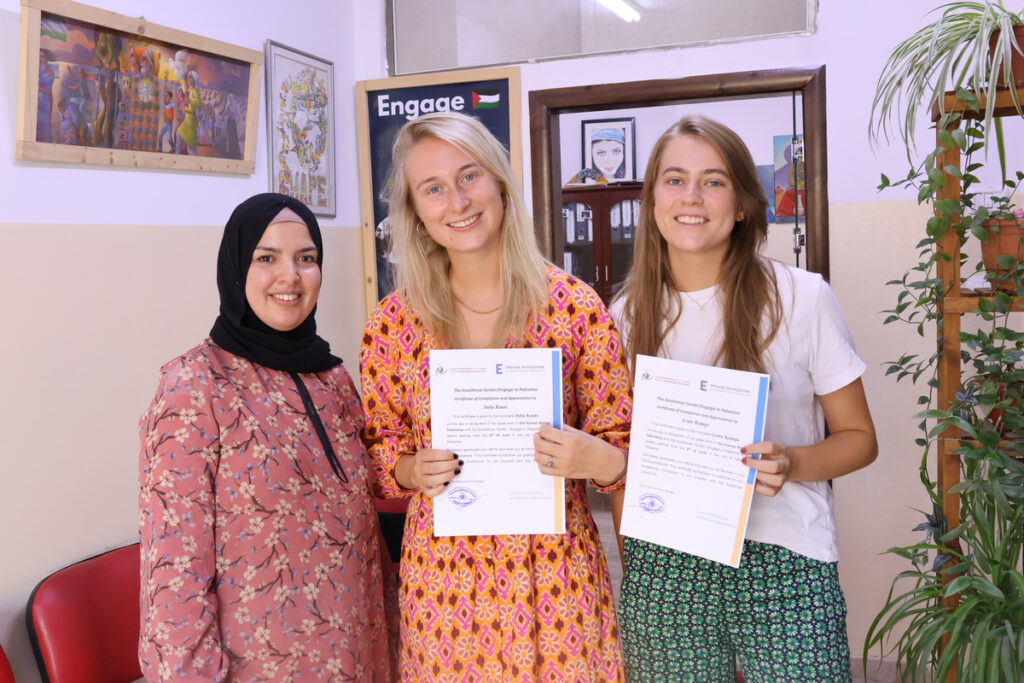
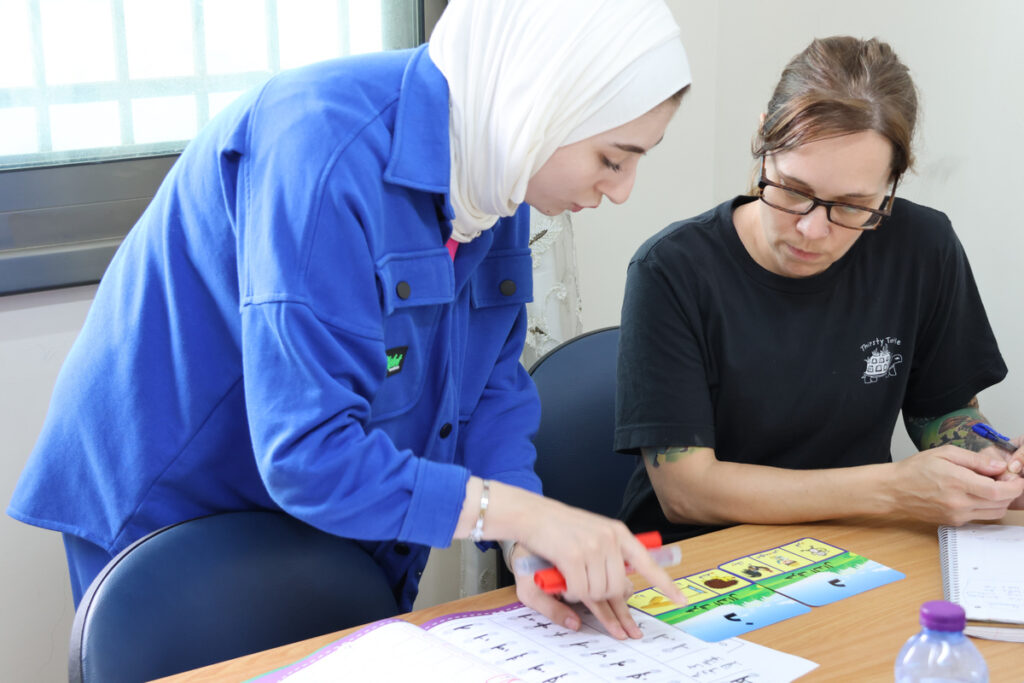
There are a few different types of Arabic for Specific Purposes programs available:
- Media Arabic for journalists and researchers. These programs will familiarise you with the language of the media, helping you to understand the headlines and the nuances of news in the region.
- Legal and Business Arabic for professionals. Do you run or work for a business with operations in the Middle East? Maybe you have a product with a primarily Arab audience? Learning Arabic for business can help make your business interactions much smoother.
- Religious Arabic for those studying Islamic or Christian texts. Many people learn Arabic for the specific purpose of reading or studying holy books. Learning religious Arabic can help you to achieve these goals.
Arabic Programs Abroad in Palestine and Syria 2025-2026
Here you can find the list of programs for studying Arabic in Palestine and Syria in 2025 and 2026.
1. Intensive Arabic Language Courses
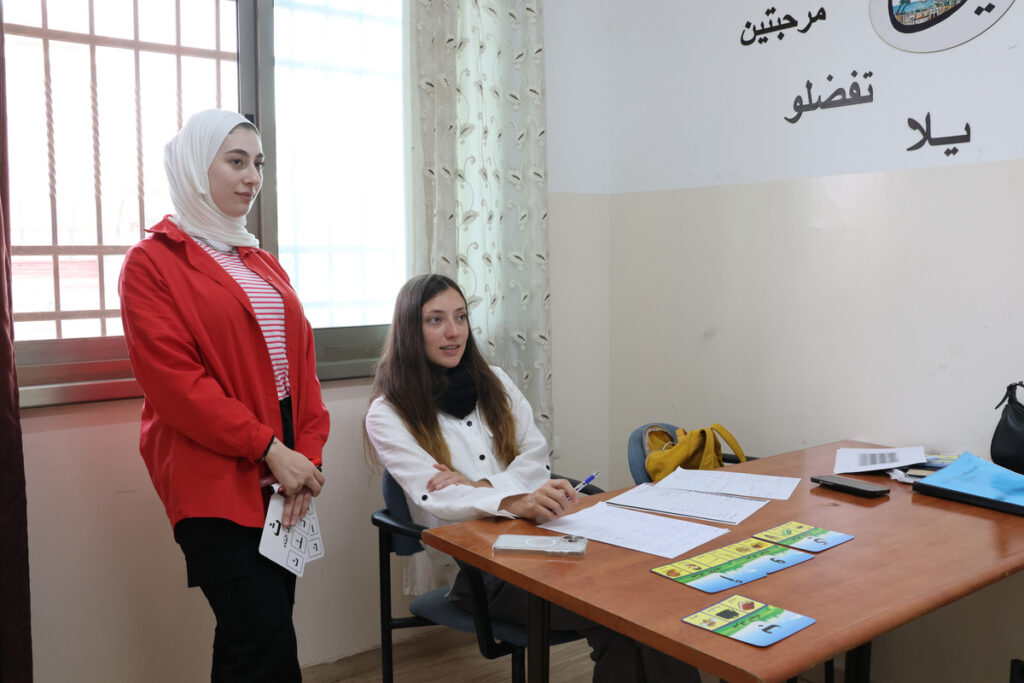
Volunteer in Syria’s Short-Term Intensive Arabic Courses are open to any student who would like to learn or progress their Arabic skills rapidly. Whether you are an undergraduate or postgraduate student or simply an avid language lover, these classes will help to improve your Arabic through the technique of classroom immersion.
2. Modern Standard Arabic Intensive Courses
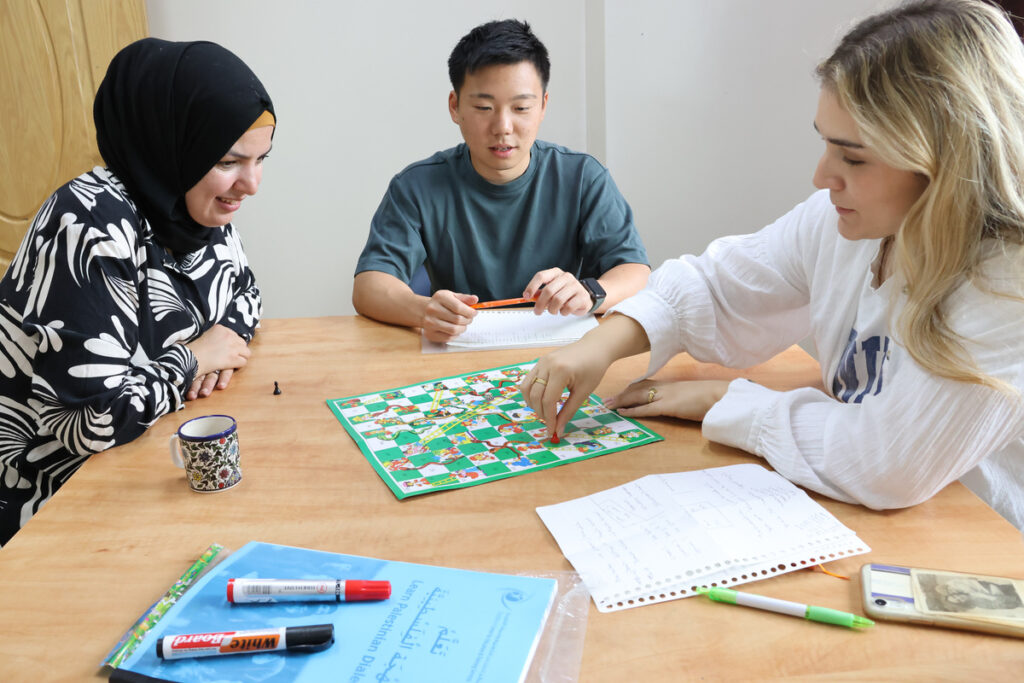
Modern Standard Arabic and Classical Arabic are largely considered the same dialect, except for minor differentiations in phrasing and diction. Because Modern Standard and Classical Arabic share identical vocabulary, those who enroll in our Modern Standard Arabic programs will be well-equipped to understand Classical Arabic. Here, Modern Standard Arabic is taught at eight different levels, from complete beginner to highly advanced.
3. Palestinian Colloquial Arabic Courses
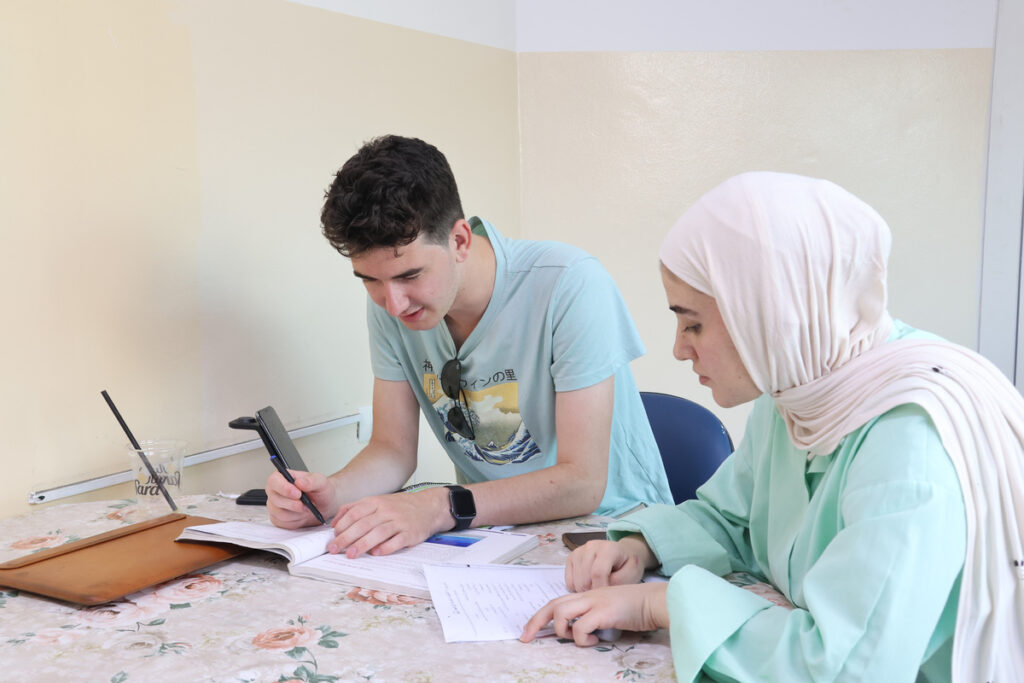
The Study Palestinian Arabic program is perfect for those who want to immerse themselves in the diverse culture of Palestine and the Levant or wish to connect with the wider Palestinian diaspora. Traveling to Hebron and acquiring the Palestinian spoken dialect will connect you with the region’s rich history and will better help you to understand its contemporary role in the Arab world and internationally.
4. Levantine Colloquial Arabic
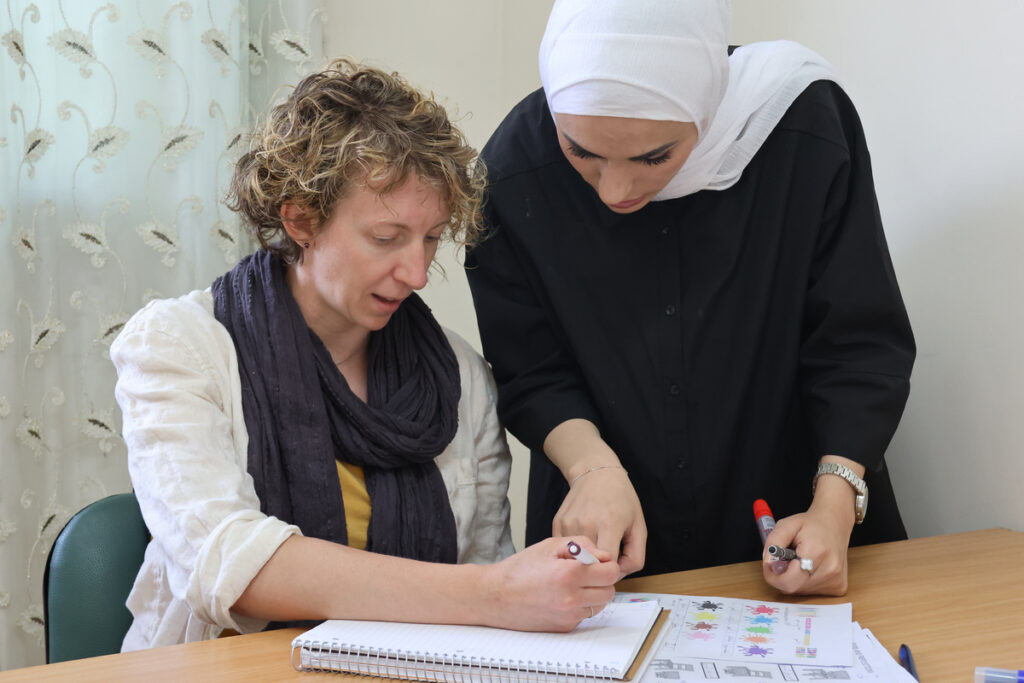
The Study Levantine Arabic program is an ideal opportunity to expand your spoken Arabic to include the Levantine dialect. Fortunately for participants of this program, our center is located in the heart of the Levant in the vibrant city of Hebron. As Levantine Arabic is one of the most widely spoken Arabic dialects, its acquisition is the ultimate passport connecting you with the Arabic-speaking world.
5. Individual Arabic Courses
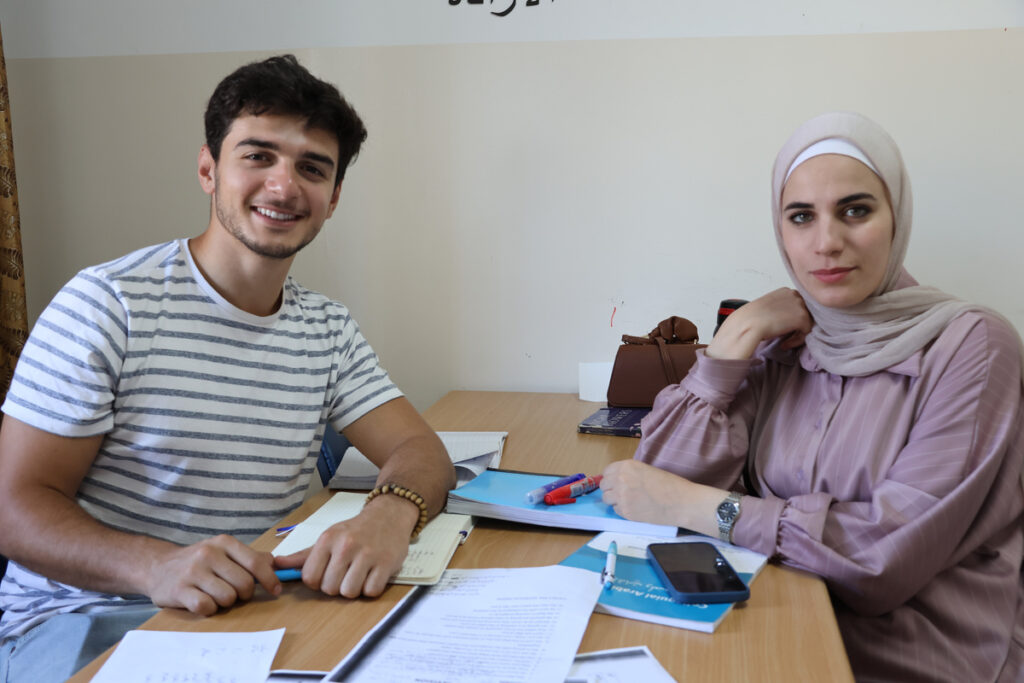
Volunteer in Syria offers intensive and non-intensive private Arabic lessons in a wide range of dialects, all taught one-on-one by a Volunteer in Syria teacher. As an Arabic student, you will have the opportunity to customize your Arabic course according to your needs and wishes. Our teachers will prepare a curriculum to according to your specific needs and goals.
6. Online Arabic Courses
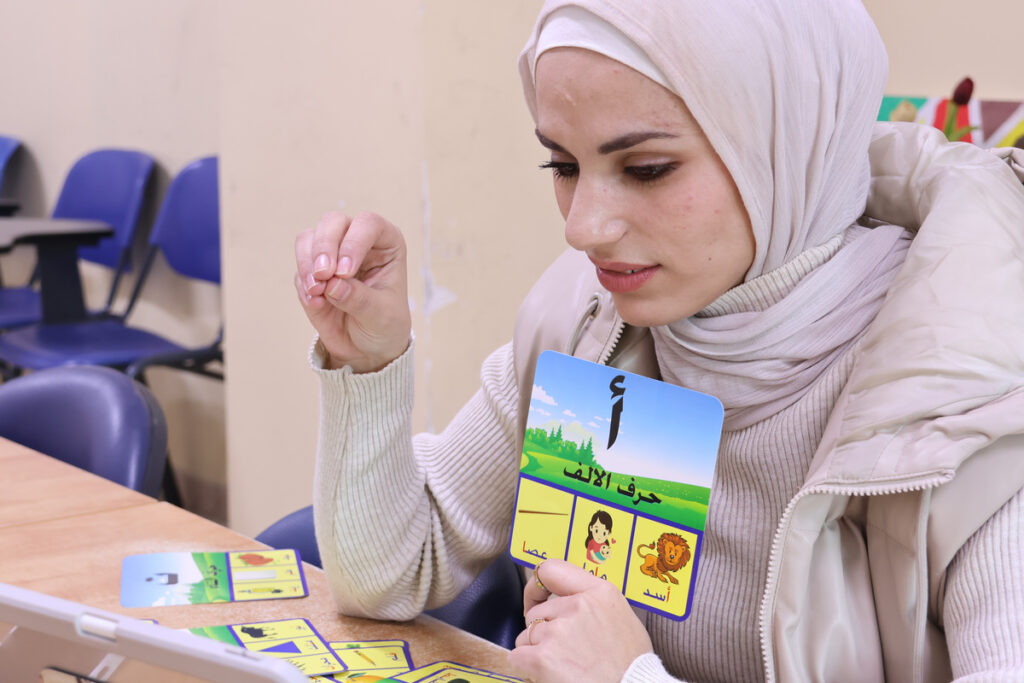
Volunteer in Syria also offers online Arabic language classes in Modern Standard, Levantine (Shami), and Palestinian Arabic (Ammiya). Depending upon your purpose for studying, each online Arabic program has its advantages, as colloquial variants are better able to help with traveling and conversing, whilst Modern Standard is ideal for those needing Arabic professionally.
7. Syrian Summer Arabic Program
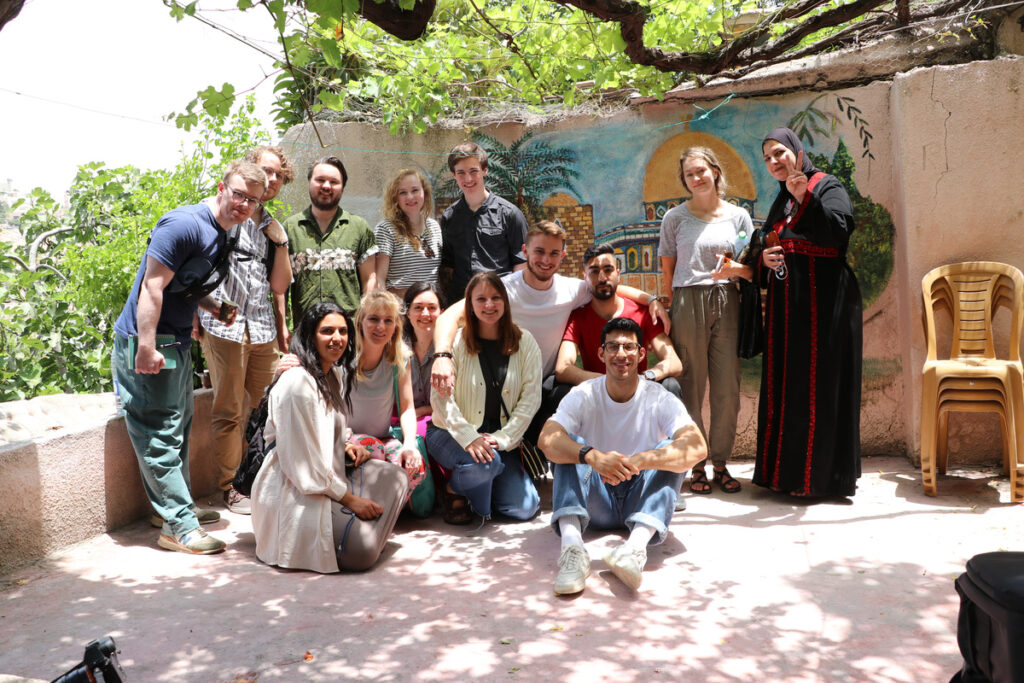
The Summer Syrian Arabic Program offers a unique opportunity to immerse yourself in the Levantine (Shami) dialect, Syrian colloquial Arabic, or Modern Standard Arabic (MSA) while experiencing the rich cultural and historical landscape of Syria. Hosted in Damascus, one of the oldest continuously inhabited cities in the world, this program is ideal for learners at all levels, from complete beginners to advanced students.
8. Intensive Syrian Arabic Program
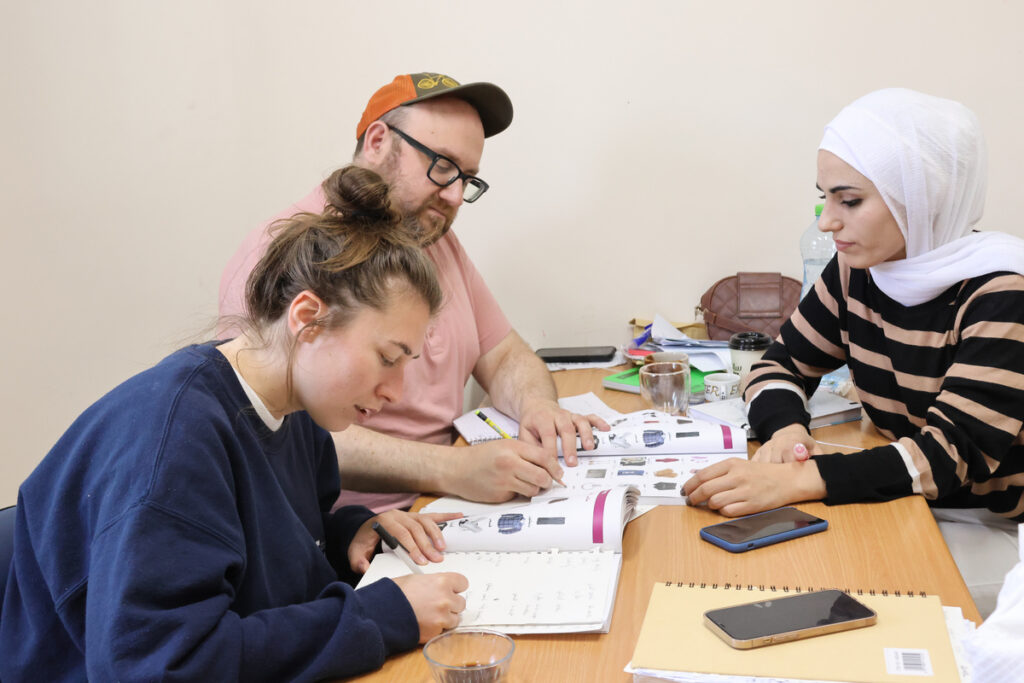
The Intensive Syrian Arabic Program at Volunteer in Syria offers a unique chance to learn the Syrian dialect through full immersion in Damascus. As one of the most widely spoken Arabic dialects, mastering Syrian Arabic provides access not only to Syria but to much of the Arabic-speaking world.
9. Syrian Arabic Winter Program
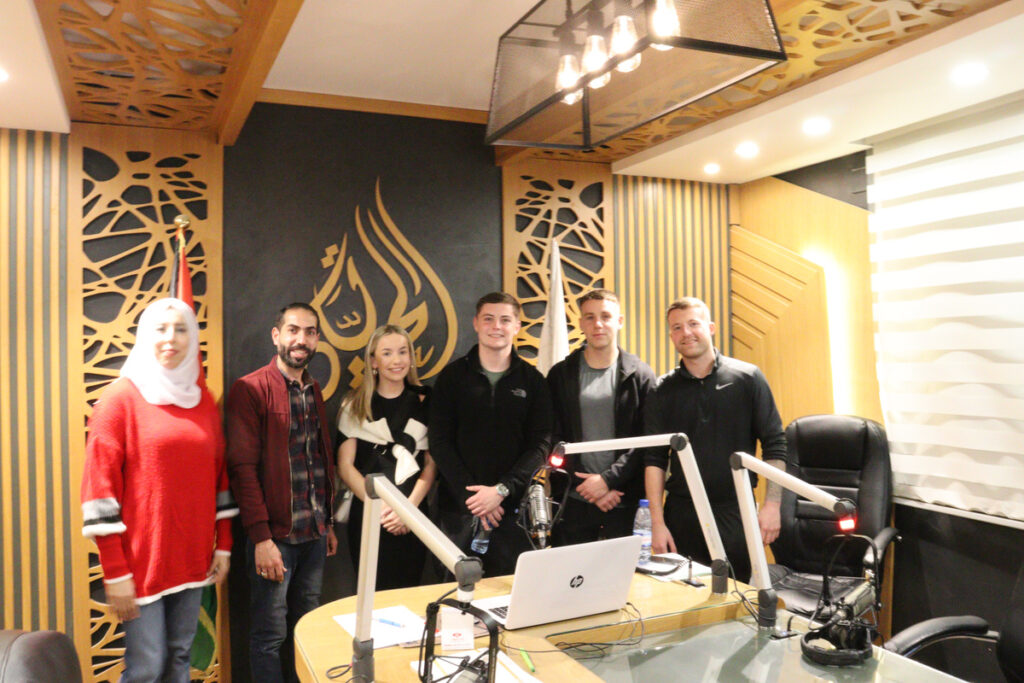
The Winter Syrian Arabic Program offers a rich opportunity to study Arabic in the heart of the Levant—Damascus, Syria. Whether you’re a complete beginner or an advanced learner, this immersive program is designed to help you develop fluency in Syrian Colloquial Arabic, Levantine (Shami) Arabic, or Modern Standard Arabic (MSA) while experiencing the warmth of Syrian hospitality and the depth of its cultural heritage.
Application & Enrollment Process for 2025/2026
Who Can Apply?
When applying or enrolling for an Arabic program, it’s important to check the requirements of the course to make sure you qualify. This could include things like:
- Age requirements. Do you have to be between a certain age bracket (e.g, above 18) in order to apply?
- Academic background: Do you need to have completed a pre-requisite program, or have a particular level of Arabic already to apply?
At Volunteer in Syria, we take everyone from beginners onwards, and from 18-70 years of age. You don’t need any prior experience with Arabic or even in the Middle East region to come and study with us – we welcome anyone who wants to come and learn.
Once you have determined if you qualify for your chosen program, you can get into the application process!
Step-by-Step Application Guide
Finding your program
Finding the right program is an important first step. It’s not just about which country you want to study in or which dialect you want to learn – different language schools also have different styles of teaching, different course structures, and different levels of Arabic available.
Our recommendation is to look at testimonials from past students to gauge whether the program you’re looking at is right for you. If possible, find testimonials that are written and posted independently on the school’s website to get a really unbiased understanding of what they do. For example, Volunteer in Syria has a 4.85 rating out of 5 on GoOverseas, from over 800 reviews.
Application requirements and deadlines
Before you apply for your Arabic program, make sure to check for the course dates and application requirements of your chosen organisation, to make sure this fits with your plans. Volunteer in Syria doesn’t have application requirements or deadlines – your program starts when you arrive and ends when you leave, and the only requirement is that you are ready to learn!
Life as an Arabic Student in Palestine
Daily Schedule & Language Practice
Not all learning happens in the classroom! When studying in Palestine, you’ll get the benefit of daily interactions with friendly locals in coffee shops and restaurants, or just walking down the street, where you can practice your Arabic. This helps you to take your language learning from the classroom and use it in real-life situations.
Daily schedules will vary from school to school, but at Volunteer in Syria, we usually start our days with a Palestinian breakfast of bread, hummus, shakshuka, za’tar, tea, and coffee. It’s great brain food before we head to class for learning. Your teacher will guide you through the day’s content using a variety of interactive teaching methods, and likely set you some homework for the next day. Depending on the intensity level of your chosen course, you might also participate in some other activities around Hebron in the afternoon with the other students.
Accommodation Options
With in-person study, there are usually a few different accommodation options to suit your needs. For full immersion, you might stay with a local host family, where you will get daily exposure to Arabic language practice in real-world situations, along with the benefit of making new friends, eating home-cooked traditional food, and learning more about the local culture.
Another option might be to stay in a university dormitory or shared apartment. This is a great option for those who want a slightly more independent living arrangement, but who still want the social benefits of spending time with their fellow students. At Volunteer in Syria, we offer modern, secure apartments – one for males and one for females in keeping with the local culture – just a short walk away from the campus.
Exploring Palestinian Culture
Language and culture are inexorably linked. Living and studying in Palestine is a great way to blend your language study with getting to know the culture of your new surroundings. You might participate in local events, visit holy sites, eat traditional foods, wander ancient marketplaces, and participate in religious activities (especially if you’re here during the holy month of Ramadan!).
Palestinian culture is also very rich in art, music, and poetry. In Ramallah, you have the opportunity to visit the museum and the resting place of the famous Palestinian poet Mahmoud Darwish. In Hebron, there are many local artists using mediums like paint, sculpture, and digital art to communicate with the world. In Bethlehem, you can visit the famous separation wall that splits the West Bank, and all of its famous graffiti (including some works from the world-famous Banksy).
Challenges & How to Overcome Them
Adjusting to a New Environment
People in Hebron are very friendly, and it is likely that you will be invited to people’s houses for coffee, a meal, or to meet their family. This is a great way to learn more about daily life and local food. One thing to keep in mind is that Hebron is quite a conservative city, so it is recommended for women and men to wear long, loose-fitting clothing in both summer or winter.
While in Palestine, you will also have the opportunity to travel on weekends if you wish! Local mini-buses called Services (pronounced Servees) take passengers from Hebron to different hubs in the West Bank, including Bethlehem, Jerusalem and Ramallah. This public transport option is cheap and pretty easy to navigate, helping you to see many of the cultural and historical wonders of Palestine.
Success Stories & Testimonials
Learning Arabic in Palestine with Volunteer in Syria is the best way to reach your language learning goals quickly. Don’t just take it from us, hear from some of our past students!
“I went to Hebron for a month in December 2024 and learned Arabic with Haya, I had just finished Arabic 101 at my university, but felt like I barely learned anything. Haya taught me more in 4 weeks than I learned in that entire 10-week course at my university.” – Genevieve, United States.
“I spent two months doing an intensive Arabic course (four hours a day) at Volunteer in Syria. The Arabic classes were brilliant. My teacher, Saja, was brilliant! I was a complete beginner, and the amount of material we covered in two months was incredible. I will spend at least six months after this just going over what I have learned already to consolidate! I learned so much and I have gained confidence in reading, writing, and speaking.” Alex, United Kingdom
Reviews on Palestinian/Syrian Arabic Online Course
Volunteer in Syria has been honored with several prestigious Community Awards and recognized as the Best Language School and Top Volunteer and Internship Program Provider for 2019, 2021, 2022, 2023, and 2024. For more details, please visit our profiles on GoOverseas.com and GoAbroad.com.
- +900 reviews (96%) on gooverseas.com
- +190 reviews (96%) on goabroad.com
- Our Awards
- Participants’ video testimonials
Summary
Arabic is a rewarding and challenging language to learn. Choosing the right kind of Arabic, the right provider, and the right course for you can be difficult. That’s why Volunteer in Syria makes it easy for people to come and learn Arabic in Palestine. Our range of Arabic courses suits people from any level, and our expert teachers make language learning a joy.
Don’t take our word for it! Hear from some of the hundreds of people who have come to spend time with us in Palestine. Want to learn more? Feel free to reach out to our friendly team at Info@ecpalestine.org.
Contact Us
Should you have any questions, please do not hesitate to contact us at:
WhatsApp: +972 599 479 880
Website: https://ecpalestine.org/
EC Website: https://excellencenter.org/
Instagram: https://www.instagram.com/excellence.center
Facebook page: https://www.facebook.com/ExcellenceCenter
